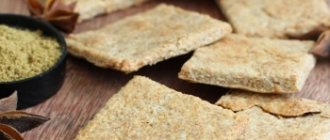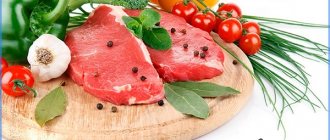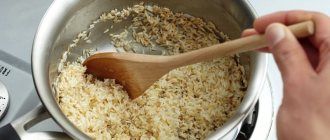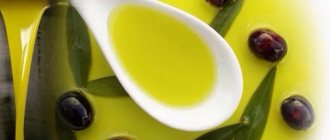How to choose a good vegetable
It must be cleared of soil so that the fruit itself can be seen ; the surface must be smooth, without wormholes or surface defects, and elastic.
If the product has not been transported and stored properly, it may wilt. It will be inconvenient to peel and difficult to grate.
The pulp will be dry, and since some of the moisture will evaporate, the bitterness contained in the root vegetable will appear more sharply.
There are no other requirements for root crops . It needs to be inspected in the same way as potatoes, cabbage, carrots, and beets are inspected.
There is no other way to evaluate the quality of a purchase, but an external inspection is often sufficient.
What can be prepared from daikon: recipes
There is a fairly wide range of dishes that contain daikon. Juicy fruits can be stewed, pickled, and added to soups and salads. Before preparing the dish, the vegetable must be washed and the edges removed from both sides.
Then the root vegetable is peeled, and it is important to cut it off at the very top, removing a small layer, since the peel contains many useful substances
Daikon can also be used as table decoration. Despite the fact that daikon is consumed in different forms, the greatest benefits can be obtained from the raw product. For example, an excellent appetizer will come from a root vegetable chopped on a coarse grater with the addition of lemon juice and herbs.
You can also make a variety of salads from this vegetable. Cabbage, cucumbers, carrots, olives, and tomatoes go well with daikon. It can be included in cottage cheese and cheese dishes, and can also be used with meats such as beef and corn. Vegetables are also great for desserts. They can be mixed with fruits, nuts and honey. It should be borne in mind that dishes with sliced daikon fruits must be eaten almost immediately, since their taste is quickly lost.
Chicken and daikon salad
Ingredients:
- chicken breast – 1 pc.;
- daikon – 1 pc.;
- tomatoes – 3 pcs.;
- onion (red) – 1 pc.;
- garlic – 2 teeth;
- cucumbers – 1 pc.;
- lemon – 0.5 pcs.;
- yogurt (natural) – 250 g;
- dill.
How to cook:
- Place chicken breast in boiling water over low heat. Cover with a lid and cook for 50–60 minutes. It is better not to remove the skin or bone from the breast, as this will make the meat more tender.
- Peel the daikon and grate it (like a Korean carrot) or cut it into strips. Cut the tomatoes into cubes.
- Prepare salad dressing. Grind the cucumber on a coarse grater, add finely chopped garlic, yogurt, dill and squeeze out lemon juice.
- After the chicken meat has cooled, disassemble it into fibers.
- Mix vegetables with meat, add dressing.
Pickled carrots with daikon
Ingredients:
- water – 1 tbsp.;
- vinegar - 0.25 tbsp.;
- sugar – 2 tbsp;
- salt – 2 tsp;
- carrots – 250 g;
- daikon – 250 g.
How to cook:
- Cut carrots and daikon into thin strips.
- Put the water to boil, heat until warm.
- Add vinegar, salt and sugar to water.
- Stir until the sugar is completely dissolved.
- Place carrots and daikon in prepared jars.
- Pour the marinade into the jars, close them tightly and let it brew.
Video:
recipe for losing weight: Japanese daikon
httpv://www.youtube.com/watch?v=embed/NyyhIP8apNc
Comparison: which radish is healthier?
Daikon is popular in Russia for a reason. This productive, early-ripening vegetable has a more delicate taste compared to its relatives - radish and radish .
It has virtually no specific bitterness of many cruciferous vegetables. Daikon does not contain mustard oils.
Among all vegetables, only radish, daikon and horseradish can dissolve kidney and liver stones, but radish and horseradish have too strong a taste and not everyone can eat them. Daikon contains almost no spiciness and many people like it.
The pulp of this root vegetable (unlike radish and radish) does not become coarse as it grows, the slight pungency in young plants gradually disappears, and the vitamin C content increases.
All the benefits and possible harms of cauliflower, contraindications for consumption and delicious recipes are in our publication.
Are roasted sunflower seeds healthy? Find the answer to the question in this material.
This publication will tell you about the beneficial properties of figs for women.
Facts about the benefits of daikon for weight loss
The popularity of daikon - a sweet radish - has increased with the fashion for Japanese cuisine. The shape of the root vegetable is in many ways reminiscent of carrots, and the white, dense pulp tastes somewhat similar to ordinary radishes. However, it should be noted that daikon, unlike radishes, does not contain mustard oils.
The beneficial properties of daikon are slightly exaggerated. Indeed, the root vegetable contains a high concentration of vitamins C, D and B, enzymes, as well as pectin and fiber. However, daikon, by definition, cannot contain the free amino acids necessary for the normal functioning of the body. Therefore, from a medical point of view, ordinary Russian radish is much healthier, because it contains amino acids, iron, organic acids and other microelements that help normalize metabolism.
Calorie content
Nutritionists advise everyone who is losing weight to eat daikon, since 100 g of this root vegetable contains only... 21 kcal. In addition, 250 g of daikon salad will provide the body’s daily need for vitamin C. This is good news, because most often people gain weight due to a lack of vitamins of this group, because their adrenal glands begin to function incorrectly, hormonal imbalance develops and, as a result, , metabolism is disrupted and extra pounds appear.
Cellulose
The fiber contained in Japanese radishes promotes active weight loss because it stabilizes blood sugar, removes toxins from the body and promotes rapid saturation. Daily consumption of 300 g of daikon will allow you to lose up to 175 kcal per day, which is equivalent to a half-hour jog.
Natural ginetic
Daikon can rightfully be called a natural fat burner. The regular presence of root vegetables in the diet allows you to remove excess calories from fats, proteins and carbohydrates from the body.
Combination with other products
Japanese radish is combined with low-fat sea fish, tomatoes, carrots, cucumber, herbs and boiled eggs. Daikon can also be prepared as a side dish for meat and potato dishes. However, for weight loss, the most optimal combination is a salad made from white radish and parsley.
Green smoothies
For active weight loss, nutritionists recommend drinking green smoothies containing daikon, parsley and cucumber.
You can also prepare a drink from radish and mango. Despite the non-standard taste combination, this cocktail promotes the rapid burning of the subcutaneous lipid layer. However, it should be taken before training or active physical activity.
Daikon juice
Root vegetable juice is a great alternative to salads. It can be easily prepared at home using a blender. However, it is recommended to take freshly squeezed daikon juice no more than 2 times a week, since too high a concentration of vitamin C can become stressful for the body.
Composition and calorie content, nutritional value, glycemic index
The calorie content of daikon radish is low - only 21 kcal per 100 g.
This volume will contain:
- 1.2 g proteins;
- 4.1 g carbohydrates;
- no fat.
The glycemic index of the vegetable is only 15 units.
Along with its low calorie content, it has a very healthy composition:
- abundance of fiber;
- glycosides;
- vitamins C (in large quantities), A, B, H, PP;
- essential amino acids;
- pectins;
- enzyme (enzyme) that promotes the digestion of starchy foods;
- bactericidal substances.
The “Live Healthy!” program will tell you about the health benefits of daikon radish and potential harm, calorie content and composition, beneficial properties and contraindications:
Contraindications for using daikon
The root vegetable has restrictions for consumption due to the content of a large amount of essential oils. It is not recommended to consume the fruit if you have an ulcer, gastritis with high acidity, or pancreatitis. Daikon causes flatulence and irritates the mucous membrane of the stomach and intestines. Therefore, people with diseases of the digestive system are recommended to eat radish once a week, sprinkling with oil.
Important! To reduce the harmful effects of the vegetable, you need to consume it in the first half of the day.
Japanese radish contains cyanogenic glycosides, which can cause goiter. However, this can be avoided by boiling the root vegetable.
Daikon is not recommended for people suffering from gout and kidney stones. Spices - horseradish, radish and mustard contribute to the formation of purines, which can trigger a gout attack.
What are the health benefits?
The “big root” is capable of removing radionuclides from the body - this is why daikon radish is useful.
The combination in the edible part of the plant of glycosides, phytoncides and protein substances of a complex structure that inhibit the growth of bacteria, the ability to cleanse the kidneys and liver, and dissolve stones make it a valuable component of a natural health pharmacy.
This plant has a variety of effects on the body:
- calcium has anti-inflammatory and antioxidant effects, regulates blood clotting;
- B vitamins take an active part in metabolism and contribute to the comprehensive development of the fetus during pregnancy;
- Vitamin C, as a strong antioxidant, normalizes the body's defense systems;
- beta-carotene helps the eye muscle to be healthy and the body to get rid of toxins;
- iron can resist anemia;
- sodium regulates salt balance;
- iodine is important for thyroid health;
- selenium helps iodine look after the thyroid gland and resists oncology;
- Phosphorus is involved in the functioning of the heart muscle, nervous system, and brain activity.
What are the beneficial properties of daikon?
- Cleansing the body. The vegetable is effectively used as a natural diuretic and laxative. The calcium and potassium salts contained in radish reliably cope with removing slagging and excess fluid from the body. Thanks to these qualities, daikon is the basis of proper and dietary nutrition, as well as cleansing diets.
- Strengthening the immune system. The fortified composition of the vegetable strengthens the body's immune forces, and protein components and phytoncides help cleanse the internal organs of microbes. Regular inclusion of daikon in the menu is a wonderful prevention of colds. The vegetable helps speed up and ease the course of diseases such as bronchitis, asthma, and various types of cough.
- Cleansing the kidneys and liver. Daikon is a natural cleanser of internal organs. The advantage of the vegetable is its pleasant taste, therefore, drinking a glass of daikon juice daily can improve the functioning of the pancreas, kidneys and liver, and also help remove stones.
- Improving the functioning of the nervous system. Since ancient times, radish has been used as a soothing product. People who suffered from nervous excitability or increased aggression were sure to drink half a glass of radish juice daily, thereby normalizing the functioning of the nervous system, gaining peace of mind and a wonderful mood. What are the benefits of daikon? Radish juice drunk before bedtime promotes full and healthy sleep.
- Prevention and treatment of diabetes. The beneficial properties of daikon radish help diabetics normalize blood sugar levels. The vegetable contains fructose, which is indispensable in the diet of patients with diabetes.
- Help in losing weight. The vegetable is a low-calorie product; the calorie content of daikon is only 18 kilocalories per 100 grams. fresh product. Radish helps cleanse the body of harmful components and get rid of toxins, so it can be safely included as a dietary product in the menu of people who want to lose weight harmlessly.
- Treatment of heart and blood vessel diseases. The beneficial qualities of the vegetable help prevent diseases such as atherosclerosis, high levels of cholesterol in the blood, and various diseases of the cardiovascular system.
- Treatment of skin ailments. Daikon radish is widely in demand in cosmetology. Using freshly squeezed juice, you can get rid of age spots and freckles, as it has whitening properties. In the treatment of acne and boils, daikon occupies a special place. It is believed that regularly rubbing radish juice into the skin helps to permanently eliminate skin inflammation and blemishes.
- Healthy hair. The fortified composition of the vegetable has a beneficial effect on the internal and external structure of hair. Radish juice rubbed into hair roots is an excellent strengthening and nourishing agent.
The benefits and harms of daikon lie in its composition. In what form can you consume this healthy vegetable? Daikon can be consumed in any form, it all depends on the preferences and wishes of the consumer. Radish can be stewed, fried, steamed, pickled or boiled. In some countries, they prefer to eat the vegetable only raw, while in other countries, daikon is used as an additional ingredient in soups, main courses and salads.
Of course, a fresh product that has not been subjected to any heat treatment is more useful. But fresh radish must be eaten immediately after preparation, since as a result of storage, most of the beneficial substances from daikon “evaporate.”
Features of the effect on the body
This vegetable is not a magic wand that eliminates a lot of problems, but its regular inclusion in the diet gradually eliminates many diseases.
He does not hide individual dangers within himself; there are general contraindications.
The main thing is moderation , because the taste of Japanese radish, although mild, still belongs to the cruciferous family, many of which are not easy food for weak stomachs.
For adult men and women
The beneficial properties of the vegetable help both sexes.
The antibacterial and antiviral effects of phytoncides will support health during epidemics and seasonal colds, and in case of respiratory illness it will help you recover faster.
Why daikon is beneficial for the body of men and women: with regular consumption of this vegetable, libido increases in representatives of both sexes, and potency increases in men .
Scientists explain this by saying that the body is cleansed, clogging elements are removed, and vitality increases.
Therefore, the daikon, although somewhat indirectly, protects the health of women and men, and even makes a feasible contribution to improving family relationships.
For pregnant and lactating women
Daikon is an excellent diuretic . The potassium salts it contains help remove excess fluid from the body, which is important for women in a position where edema becomes a constant companion of pregnant women.
Along with excess fluid, waste and toxins are removed from the body.
Like other cruciferous vegetables, Japanese radish is a source of calcium, and supporting the skeletal system and teeth is very important for a pregnant woman.
Indeed, during this period, her body shares nutrients and structural substances with the growing fetus.
For children
You can give your child a taste of daikon no earlier than he turns 3-4 years old .
This environmentally friendly root vegetable, which does not absorb heavy metal salts from the soil, deserves to become part of the daily children's diet.
You should not force your child to eat daikon: this is not the only healthy vegetable that you can purchase or grow in your garden beds.
If your baby likes juicy white radish, you need to make sure that he doesn’t overeat and doesn’t fill his intestines and stomach with too much fiber.
A few slices a day will be enough. Kids like salads and just pieces of fresh vegetables cut from root vegetables.
Contraindications for use are prohibitions from the attending physician in case of health problems that are incompatible with the use of daikon.
On the advice of a specialist, the presence of white radish in the diet of a small family member is minimized or completely eliminated.
For the elderly
Due to the abundance of fiber, older people should eat daikon carefully . Digestion weakens with age, and diseases appear.
But there is an alternative - instead of daikon pulp, you can use its juice. This is a mild laxative and diuretic, which will be a valuable quality for older people.
It would be good if they could replace some of the daily pills with a natural product. For those who regularly drink daikon juice in the evening, the intestines are easily cleansed naturally in the morning.
Daikon and cosmetology
Daikon can also be used in cosmetology – it improves skin health. Firstly, by cleansing our body from the inside and removing waste and toxins from it, it already makes our skin healthy. But to nourish your facial skin, you can make masks from chopped vegetables. Such masks help whiten the skin from freckles, pigmentation and get rid of acne.
You can add other components to daikon masks, depending on the condition of your skin. For example, if the skin is dry, then sour cream, cream, and cosmetic oils are added to nourish and moisturize. If the skin is oily, then add a mixture of cucumber, aloe or honey.
For those who monitor the condition of their skin, such simple and natural procedures eliminate fine wrinkles, pigmentation, flaking and give the skin a healthy appearance. By regularly taking masks, the skin becomes firm and elastic.
Radish can be included in the diet menu, as it is very low in calories. Therefore, whoever decides to lose excess weight, daikon is just the vegetable that can be used in dietary nutrition. When consuming it, the feeling of hunger does not come for a long time - coarse fiber is not digested quickly, and therefore no snacks are required.
Potential danger
The danger lies not so much in the product as in its excessive consumption.
A possible problem is the abundance of fiber in the composition .
Because of this, daikon is not recommended for people with diseases of the stomach and intestines during an exacerbation, and during remission the vegetable is consumed in small portions, finely grated or heat-treated.
Direct contraindications are only peptic ulcers and acute gastritis. It is also contraindicated for gout, problems with the thyroid gland, and urolithiasis.
If you have the listed and associated diseases, you can include the product in your diet only after consulting a doctor .
What are the health benefits of peach? Read our article!
You can learn about the beneficial properties of chicken liver from this material.
The medicinal properties and contraindications of the herb called mint are discussed in this publication.
Useful properties of daikon
Daikon is unique in one way. It does not absorb heavy metal salts, nitrates and pesticides from the soil. Therefore, you can safely eat it without fear of harmful substances. Moreover, Japanese radish brings enormous benefits to the body.
Strengthens the immune system. This property of daikon exists due to its high vitamin content. This is why many doctors recommend eating a small amount of salad daily. Of course, from fresh root vegetables
This is especially important because during heat treatment, phytoncides evaporate and protein is denatured. But this couple helps to destroy many pathogenic bacteria and microbes in the body
By the way, traditional medicine uses daikon juice mixed with real honey to successfully cure many diseases of the respiratory system. Bronchitis, cough, tracheitis - they cannot resist a powerful vitamin blow.
Improves the functioning of the nervous system.
The same traditional medicine suggests treating aggression and nervous excitability with fresh daikon juice. By the way, the data is confirmed by research. Drinking root vegetable juice at night promotes good sleep and calms the nervous system.
After such treatment, a person wakes up in the morning in a good mood, rested and calm.
Helps you lose weight.
This ability of daikon allows you to safely include it in various diets for those who want to lose weight or are simply watching their figure.
Cleanses the body.
People have long noticed that the root vegetable has a powerful diuretic effect. And its laxative effect is mild and correct, unlike the familiar black radish. Therefore, fans of cleansing diets and proper nutrition greatly value and respect Japanese radish.
By the way, the diuretic effect is achieved due to the content of potassium and calcium salts in daikon juice. Therefore, traditional medicine treats stones and sand in the kidneys. According to reviews, the method is a stunning success. But not during the period of exacerbation of the disease! Because inflamed kidneys do not cope well with their duties even without a diuretic, and then there is a strong shock.
Advice. We still do not recommend self-medication. Despite all the popular wisdom, no one has canceled the knowledge of official medicine. Therefore, be sure to consult your doctor or a competent specialist. (The neighbor's grandmother is not an expert. Neither is a friend.)
Cleanses the liver.
The powerful property of dissolving stones and sand has been noted in daikon for a long time. But that's not all. The root vegetable has a unique choleretic effect. Therefore the daikon:
- expels “bad” bile
- stimulates the production of “good”
- helps the liver work
- removes toxins
- stimulates the pancreas
As you can see, Japanese radish can be safely called a natural hepatoprotector.
Recommendations for preparation and use
The vegetable is consumed fresh . In our country, it is customary to serve it by peeling the skin, grating it on a fine grater, lightly seasoning it with vegetable oil and adding salt. In Japan, it is stewed, boiled and even dried.
If the root vegetable is too large, you can cut off part of it and use it for food, and store the rest in a plastic bag in the vegetable compartment of the refrigerator. It can be kept this way for up to 2 weeks.
Daikon is gaining popularity because it lacks the harsh bitterness of radish. The healthiest thing is to eat it fresh , but you can stew it, season soups with it, pickle it, pickle it.
Salads made from this root vegetable go well with starchy foods, since daikon contains an enzyme that promotes the breakdown of starches in the gastrointestinal tract.
There are no components in the vegetable pulp that can cause allergies , so dishes with its addition are well tolerated by many, unless there are other contraindications.
The abundance of fiber and low calorie content make Japanese radish an ideal product for those who want to lose weight.
In cooking
There are several dozen salads with daikon alone. It is combined with herbs and other vegetables , walnuts, pears, apples, honey, sesame seeds, cottage cheese, and boiled eggs.
The dressing for such salads is made with sour cream, lemon juice, mayonnaise, vegetable oil, vinegar, and soy sauce.
If a whole vegetable can be stored in the refrigerator for a long time, then it is better to eat the grated one immediately , because when combined with salt, it soon leaks juice and the salad becomes watery.
Here are some simple dishes that feature this white root vegetable as one of their ingredients.
Sandwich with caviar . Cut two thin circles from the peeled vegetable, layer them with cod roe. The result is an original appetizer that can decorate a buffet table.
Chinese soup . Bring chicken broth (2 cups) to a boil and add 75 g of grated daikon for Korean carrots.
Reduce heat so that the liquid simmers slightly, leave for 5 minutes, add salt and pepper, pour into a serving plate, add a spoonful of sesame oil and half a stalk of leek cut into strips.
Salad with tuna . Grate the daikon on a coarse grater, mix with chopped parsley, mash, drain off excess moisture, add a third of a can of canned tuna, chopped with a fork.
Pour in the sauce mixed from a tablespoon of white wine vinegar, a teaspoon of sugar, 2 teaspoons of olive oil, 2 g of ground pepper.
This healthy vegetable can be used as a side dish for fish, preferably fresh, because heat treatment reduces the amount of nutrients in the product.
Young leaves can be used in salads: they have a high content of vitamin C.
Japanese salad with daikon, video recipe:
For weight loss
Although you won’t be satisfied with just daikon, overweight people can include it in their diet as a substitute for more high-calorie dishes.
Fiber and microelements will provide the body with support and cleansing , and at the same time eliminate bad cholesterol.
An excellent detox remedy would be white root juice .
Drinking half a glass after dinner can stimulate weight loss by removing excess fluid from the body, allowing easy bowel movements, and getting rid of bad cholesterol.
Those who want to lose weight are recommended to use the following cocktail : grind Japanese radish and fresh cucumber taken in equal proportions in a blender with the addition of parsley to taste.
This thick drink not only stimulates metabolism, but also removes harmful substances from the body.
For the treatment of diseases, in folk medicine
Root vegetables are very juicy, so extracting juice from them is not difficult. The folk hospital offers recipes that use the pulp and juice of the plant.
For arrhythmia, grate the Japanese radish, add granulated sugar and wait until the juice is released. It should be taken before meals, a tablespoon three times a day.
For diabetes, peel a small piece of root vegetable, squeeze out the juice, pour into a glass jar, and store in the refrigerator for no more than a day. Throw out any unused remains and make a new batch.
Take 2 tbsp. spoons three times a day after meals. Recommended for getting rid of bad cholesterol and maintaining blood glucose levels at the required level.
To speed up the process of liquefying mucus, drink 50 g of root juice three times a day, mixing it with honey. This drink will also help you get rid of viruses and bacteria more effectively and strengthen your respiratory system.
For anemia, grate carrots, beets and Japanese radishes, mix, place in the oven at the lowest temperature for three hours.
Give children a teaspoon of the mixture twice a day before meals, adults - a tablespoon three times a day. The course is at least 2 months.
How to eat daikon
There are several options for eating daikon. The most common involves adding grated radish to vegetable salads. The product also perfectly complements lean meats. In some cases, vitamin soups are prepared on its basis. For the winter it is pickled and preserved. In terms of taste, the root vegetable goes well with:
- pear;
- cottage cheese;
- honey;
- cheese;
- sesame;
- nuts.
Not only the root vegetable is on sale, but also its leaves and shoots. They contain the same amount of nutrients. Due to their short shelf life, you can’t buy them everywhere. The leaves are usually added to vegetable salads and soups.
To minimize irritation to the digestive system, daikon is consumed in the form of a smoothie or juice. It is recommended to drink it before doing physical exercise to speed up the fat burning process. Drink more than 1 tbsp. juice per day is not advisable.
Attention! The root vegetable is recommended to be consumed raw. Under the influence of heat treatment, some of the useful components in it are destroyed.
Methods of application
In Japan and China, daikon has been eaten for thousands of years. There it is included in the daily menu. In the East there are many ways to use the fruit. In Japan, radishes are served with sushi, stewed with seafood, salted for the winter and dried. In addition, miso soup is boiled and seasoned. In China, pies are baked from the vegetable, and in Korea, kamchi is prepared. In addition to the fruit itself, the tops and shoots are eaten.
In folk medicine
The eastern root vegetable is widely used by healers.
Healing properties are used by healers for various purposes:
- Daikon leaves and juice are a good remedy for constipation. To prepare the infusion, take 1 tbsp. spoon of tops and pour a glass of boiling water. Leave covered for 40 minutes. Take cooled and strained 3 times a day 20 minutes after meals for 2-3 days.
- To treat purulent wounds, lotions made from pulp are used. To do this, the fruit is grated and applied, secured with a bandage. After a few hours, the bandage is replaced.
- Daikon is used as a remedy for arrhythmia. In this case, juice obtained from candied radish pieces is used. Take 1 tbsp. l. three times a day. Attention! Before using the traditional method, consult your doctor. Daikon stimulates cardiac activity.
- The antibacterial and antiviral properties of Japanese radish allow it to be used as a remedy for colds. In this case, the vegetable is consumed in the form of a salad or freshly squeezed juice mixed with honey.
Lots of vitamin C
In addition to its dietary value, white radish brings many benefits to the body.
Article for you:
Avocado: benefits and harm to the body, how to eat it
It contains a lot of vitamin C, which strengthens the immune system and has antioxidant effects.
The root vegetable can be an excellent cleansing product for the body.
It contains many active enzymes that promote the proper functioning of the digestive tract, so it can be a good side dish for heavy and fatty dishes.










